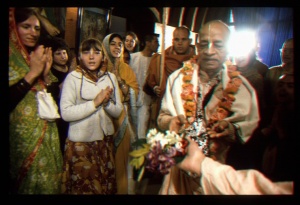CC Madhya 22.26 (1975): Difference between revisions
(Vanibot #0027: CCMirror - Mirror CC's 1996 edition to form a basis for 1975) |
(Vanibot #0020: VersionCompareLinker - added a link to the Version Compare feature) |
||
| Line 2: | Line 2: | ||
<div style="float:left">'''[[Sri Caitanya-caritamrta (1975)|Śrī Caitanya-caritāmṛta (1975)]] - [[CC Madhya (1975)|Madhya-līlā]] - [[CC Madhya 22 (1975)|Chapter 22: The Process of Devotional Service]]'''</div> | <div style="float:left">'''[[Sri Caitanya-caritamrta (1975)|Śrī Caitanya-caritāmṛta (1975)]] - [[CC Madhya (1975)|Madhya-līlā]] - [[CC Madhya 22 (1975)|Chapter 22: The Process of Devotional Service]]'''</div> | ||
<div style="float:right">[[File:Go-previous.png|link=CC Madhya 22.25 (1975)|Madhya-līlā 22.25]] '''[[CC Madhya 22.25 (1975)|Madhya-līlā 22.25]] - [[CC Madhya 22.27 (1975)|Madhya-līlā 22.27]]''' [[File:Go-next.png|link=CC Madhya 22.27 (1975)|Madhya-līlā 22.27]]</div> | <div style="float:right">[[File:Go-previous.png|link=CC Madhya 22.25 (1975)|Madhya-līlā 22.25]] '''[[CC Madhya 22.25 (1975)|Madhya-līlā 22.25]] - [[CC Madhya 22.27 (1975)|Madhya-līlā 22.27]]''' [[File:Go-next.png|link=CC Madhya 22.27 (1975)|Madhya-līlā 22.27]]</div> | ||
{{CompareVersions|CC|Madhya 22.26|CC 1975|CC 1996}} | |||
{{RandomImage}} | {{RandomImage}} | ||
==== TEXT 26 ==== | ==== TEXT 26 ==== | ||
| Line 11: | Line 10: | ||
<div class="verse"> | <div class="verse"> | ||
:cāri varṇāśramī yadi kṛṣṇa nāhi bhaje | :cāri varṇāśramī yadi kṛṣṇa nāhi bhaje | ||
:svakarma karite se raurave | :svakarma karite se raurave paḍi' maje | ||
</div> | </div> | ||
| Line 18: | Line 17: | ||
<div class="synonyms"> | <div class="synonyms"> | ||
cāri varṇa-āśramī—followers of the four social and spiritual orders of life; yadi—if; kṛṣṇa—Lord Kṛṣṇa; nāhi—not; bhaje—serve; sva-karma karite—performing his duty in life; se—that person; raurave—in a hellish condition; | cāri varṇa-āśramī—followers of the four social and spiritual orders of life; yadi—if; kṛṣṇa—Lord Kṛṣṇa; nāhi—not; bhaje—serve; sva-karma karite—performing his duty in life; se—that person; raurave—in a hellish condition; paḍi'-falling down; maje—becomes immersed. | ||
</div> | </div> | ||
| Line 25: | Line 24: | ||
<div class="translation"> | <div class="translation"> | ||
"The followers of the varṇāśrama institution accept the regulative principles of the four social orders [brāhmaṇa, kṣatriya, vaiśya and śūdra] and four spiritual orders [brahmacarya, gṛhastha, vānaprastha and sannyāsa]. However, if one carries out the regulative principles of these orders but does not render transcendental service to Kṛṣṇa, he falls into the hellish condition of material life. | |||
</div> | </div> | ||
| Line 32: | Line 31: | ||
<div class="purport"> | <div class="purport"> | ||
One may be a brāhmaṇa, kṣatriya, vaiśya or śūdra, or one may perfectly follow the spiritual principles of brahmacarya, gṛhastha, vānaprastha and sannyāsa, but ultimately one falls down into a hellish condition unless one becomes a devotee. Without developing | One may be a brāhmaṇa, kṣatriya, vaiśya or śūdra, or one may perfectly follow the spiritual principles of brahmacarya, gṛhastha, vānaprastha and sannyāsa, but ultimately one falls down into a hellish condition unless one becomes a devotee. Without developing one's dormant Kṛṣṇa consciousness, one cannot be factually elevated. The regulative principles of varṇāśrama-dharma in themselves are insufficient for attainment of the highest perfection. That is confirmed in the following two quotations from Śrīmad-Bhāgavatam ([[SB 11.5.2|11.5.2-3]]). | ||
</div> | </div> | ||
Latest revision as of 14:25, 27 January 2020

A.C. Bhaktivedanta Swami Prabhupada
TEXT 26
- cāri varṇāśramī yadi kṛṣṇa nāhi bhaje
- svakarma karite se raurave paḍi' maje
SYNONYMS
cāri varṇa-āśramī—followers of the four social and spiritual orders of life; yadi—if; kṛṣṇa—Lord Kṛṣṇa; nāhi—not; bhaje—serve; sva-karma karite—performing his duty in life; se—that person; raurave—in a hellish condition; paḍi'-falling down; maje—becomes immersed.
TRANSLATION
"The followers of the varṇāśrama institution accept the regulative principles of the four social orders [brāhmaṇa, kṣatriya, vaiśya and śūdra] and four spiritual orders [brahmacarya, gṛhastha, vānaprastha and sannyāsa]. However, if one carries out the regulative principles of these orders but does not render transcendental service to Kṛṣṇa, he falls into the hellish condition of material life.
PURPORT
One may be a brāhmaṇa, kṣatriya, vaiśya or śūdra, or one may perfectly follow the spiritual principles of brahmacarya, gṛhastha, vānaprastha and sannyāsa, but ultimately one falls down into a hellish condition unless one becomes a devotee. Without developing one's dormant Kṛṣṇa consciousness, one cannot be factually elevated. The regulative principles of varṇāśrama-dharma in themselves are insufficient for attainment of the highest perfection. That is confirmed in the following two quotations from Śrīmad-Bhāgavatam (11.5.2-3).